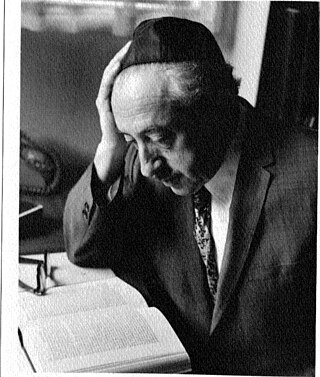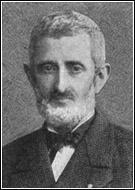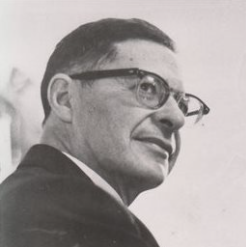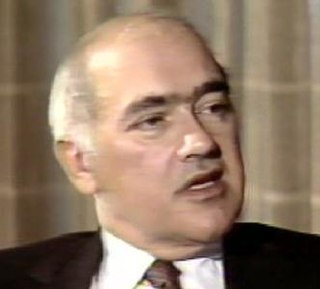
Abraham Joshua Heschel was a Polish-American rabbi and one of the leading Jewish theologians and Jewish philosophers of the 20th century. Heschel, a professor of Jewish mysticism at the Jewish Theological Seminary of America, authored a number of widely read books on Jewish philosophy and was a leader in the civil rights movement.

In religion and theology, revelation is the revealing or disclosing of some form of truth or knowledge through communication with a deity or other supernatural entity or entities.

There is no established formulation of principles of faith that are recognized by all branches of Judaism. Central authority in Judaism is not vested in any one person or group - although the Sanhedrin, the supreme Jewish religious court, would fulfill this role if it were re-established - but rather in Judaism's sacred writings, laws, and traditions.

Jewish philosophy includes all philosophy carried out by Jews, or in relation to the religion of Judaism. Until modern Haskalah and Jewish emancipation, Jewish philosophy was preoccupied with attempts to reconcile coherent new ideas into the tradition of Rabbinic Judaism, thus organizing emergent ideas that are not necessarily Jewish into a uniquely Jewish scholastic framework and world-view. With their acceptance into modern society, Jews with secular educations embraced or developed entirely new philosophies to meet the demands of the world in which they now found themselves.
Religious pluralism is a set of religious world views that hold that one's religion is not the sole and exclusive source of truth, and thus recognizes that some level of truth and value exists in other religions. As such, religious pluralism goes beyond religious tolerance, which is the condition of peaceful existence between adherents of different religions or religious denominations.
The Book of Beliefs and Opinions is a book written by Saadia Gaon which is the first systematic presentation and philosophic foundation of the dogmas of Judaism.
Neo-Hasidism, Neochassidut, or Neo-Chassidus, is an approach to Judaism in which people learn beliefs and practices of Hasidic Judaism, and incorporate it into their own lives or prayer communities, yet without formally joining a Hasidic group. Over the last century neo-Hasidism was popularized by the works of writers such as Hillel Zeitlin, Martin Buber, Abraham Joshua Heschel, Lawrence Kushner, Zalman Schachter-Shalomi, and Arthur Green.
Tikkun olam is a concept in Judaism, which refers to various forms of action intended to repair and improve the world.
Academic study of Jewish mysticism, especially since Gershom Scholem's Major Trends in Jewish Mysticism (1941), draws distinctions between different forms of mysticism which were practiced in different eras of Jewish history. Of these, Kabbalah, which emerged in 12th-century Europe, is the most well known, but it is not the only typological form, nor was it the first form which emerged. Among the previous forms were Merkabah mysticism, and Ashkenazi Hasidim around the time of the emergence of Kabbalah.

Eliezer Berkovits, was a rabbi, theologian, and educator in the tradition of Orthodox Judaism.

Gordon Tucker is a prominent rabbi, with a reputation as both a political and a theological liberal in Conservative Judaism. He is the former senior rabbi of Temple Israel Center in White Plains, New York. Since September 2020, he has served as the Vice Chancellor for Religious Life and Engagement at the Jewish Theological Seminary of America.
Pardes (פרד"ס) is a Kabbalistic theory of Biblical exegesis first advanced by Moses de León. The term, sometimes also rendered PaRDeS, is an Hebrew abbreviation formed from the initials of the following four approaches:
Hasidic philosophy or Hasidism, alternatively transliterated as Hasidut or Chassidus, consists of the teachings of the Hasidic movement, which are the teachings of the Hasidic rebbes, often in the form of commentary on the Torah and Kabbalah. Hasidism deals with a range of spiritual concepts such as God, the soul, and the Torah, dealing with esoteric matters but often making them understandable, applicable and finding practical expressions.

Elijah Benamozegh, sometimes Elia or Eliyahu, was an Italian Sephardic Orthodox rabbi and renowned Jewish Kabbalist, highly respected in his day as one of Italy's most eminent Jewish scholars. He served for half a century as rabbi of the important Jewish community of Livorno, where the "Piazza Benamozegh" now commemorates his name and distinction. His major work is Israel and Humanity (1863), which was translated into English by Dr. Mordechai Luria in 1995.

God in Judaism has been conceived in a variety of ways. Traditionally, Judaism holds that Yahweh, the god of Abraham, Isaac, and Jacob and the national god of the Israelites, delivered the Israelites from slavery in Egypt, and gave them the Law of Moses at Mount Sinai as described in the Torah. Jews traditionally believe in a monotheistic conception of God, which is both transcendent and immanent.

Ben-Zion Bokser was a major Conservative rabbi in the United States.
Jewish existentialism is a category of work by Jewish authors dealing with existentialist themes and concepts, and intended to answer theological questions that are important in Judaism. The existential angst of Job is an example from the Hebrew Bible of the existentialist theme. Theodicy and post-Holocaust theology make up a large part of 20th century Jewish existentialism.

Pinchas Hacohen Peli was an Israeli modern Orthodox rabbi, essayist, poet, and scholar of Judaism and Jewish philosophy.

Seymour Siegel, often referred to as "an architect of Conservative Jewish theology," was an American Conservative rabbi, a Professor of Ethics and Theology at the Jewish Theological Seminary of America (JTS), the 1983-1984 Executive Director of the United States Holocaust Memorial Council," and an advisor to three American Presidents, Richard Nixon, Gerald Ford, and Ronald Reagan.
Shai Held is President, Dean, and Chair in Jewish Thought at the Hadar institute, which he founded in 2006 with Rabbis Elie Kaunfer and Ethan Tucker.











